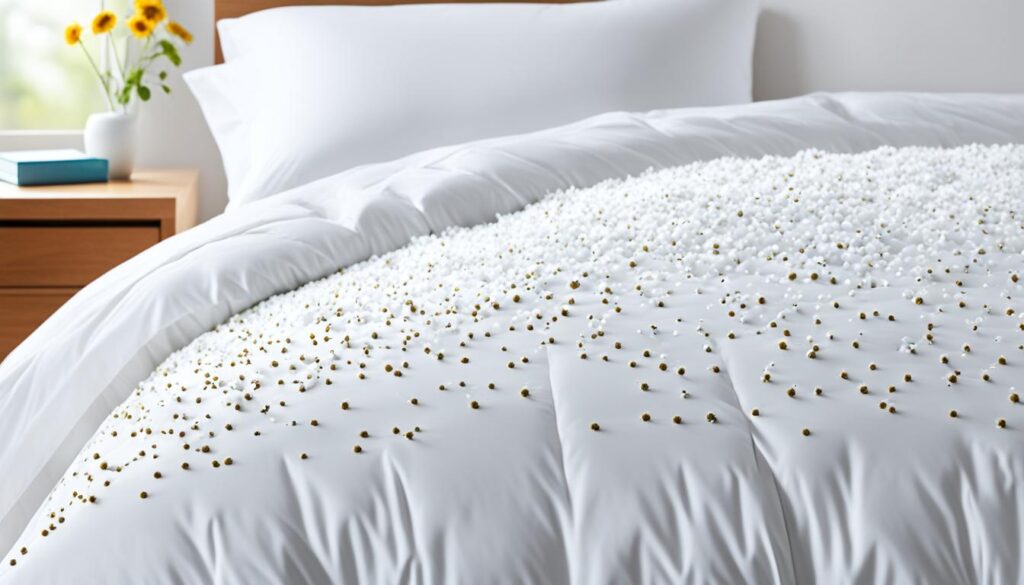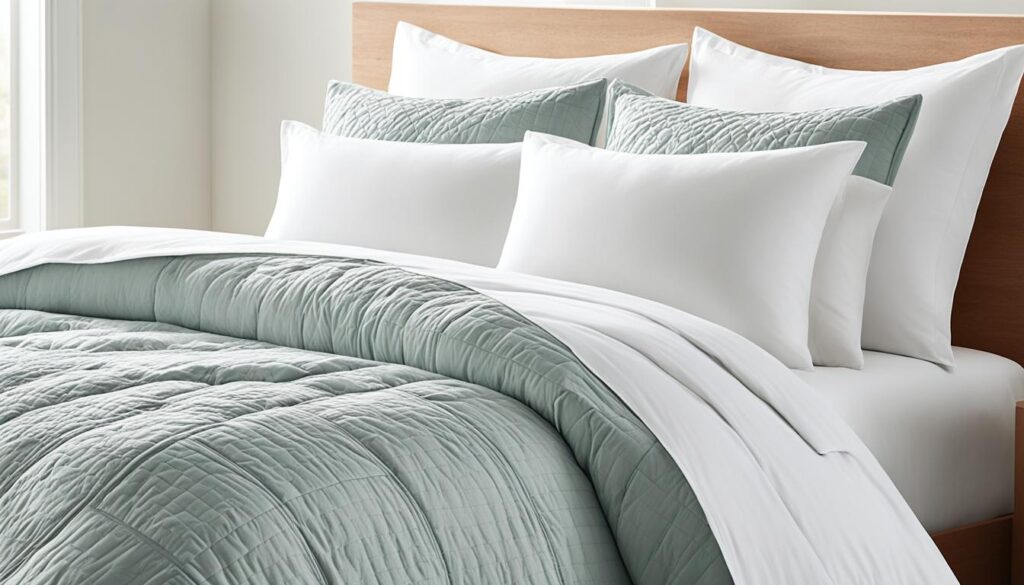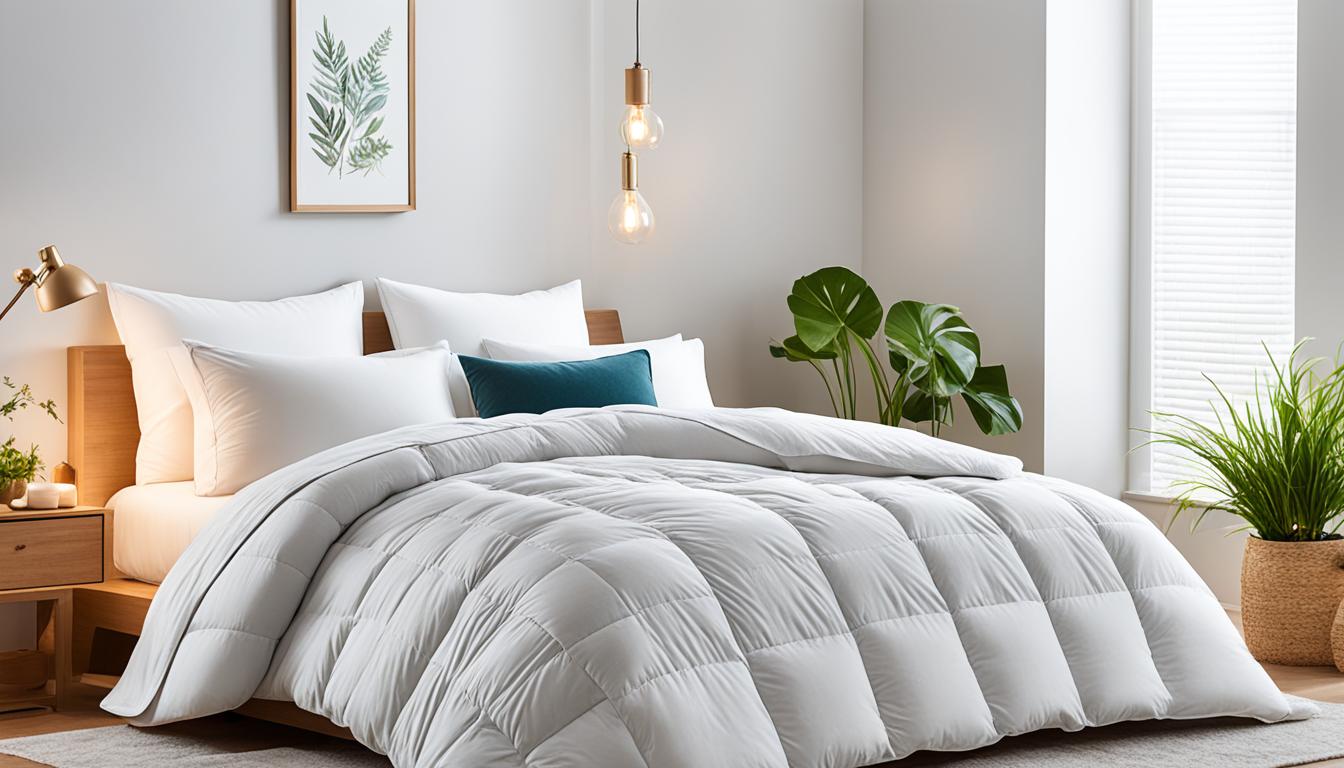Are you an allergy sufferer looking for a good night’s sleep but can never seem to find the right comforter? Comforters for allergies come in a variety of styles and designs, but not all of them are created equal.
Investing in a hypoallergenic comforter is an excellent solution to your allergy problems. These comforters are specifically designed to help allergy sufferers get quality sleep by reducing allergens like dust, pet hair, and mold. With the right hypoallergenic comforter, you can finally say goodbye to sneezing, itching, and other allergic reactions that disrupt your sleep.
Contents
- 1 What Makes a Comforter Hypoallergenic?
- 2 Choosing the Right Hypoallergenic Comforter
- 3 Benefits of Hypoallergenic Comforters
- 4 How to Care for Hypoallergenic Comforters
- 5 Top Recommendations for Hypoallergenic Comforters
- 6 Conclusion
- 7 FAQ
- 7.1 What is a hypoallergenic comforter?
- 7.2 Are hypoallergenic comforters suitable for all types of allergies?
- 7.3 How do hypoallergenic comforters provide allergy relief?
- 7.4 Can hypoallergenic comforters be breathable?
- 7.5 How do I clean and care for a hypoallergenic comforter?
- 7.6 How long do hypoallergenic comforters last?
Key Takeaways:
- Hypoallergenic comforters are designed for allergy sufferers and reduce allergens such as dust, pet hair, and mold.
- Investing in a hypoallergenic comforter can help reduce sneezing, itching, and other allergic reactions that disrupt your sleep.
- When looking for the right hypoallergenic comforter, make sure to consider factors like breathability, allergy relief capabilities, and allergen-free properties.
- Proper care and maintenance are crucial to prolonging the lifespan of your hypoallergenic comforter.
- Check out our top recommendations for hypoallergenic comforters specifically designed for allergy sufferers.
What Makes a Comforter Hypoallergenic?
For allergy sufferers, choosing the right comforter can make all the difference in getting a restful night’s sleep. Understanding what makes a comforter hypoallergenic is crucial in making an informed purchase decision.
So, what sets hypoallergenic comforters apart from regular bedding options? The answer lies in their key features which aim to reduce allergens and irritants:
| Feature | Description |
|---|---|
| Allergy-friendly materials | Hypoallergenic comforters are made with materials that are less likely to trigger allergic reactions such as natural fabrics like cotton, silk, or bamboo, or synthetic alternatives like microfiber and polyester. |
| Dust mite resistance | Dust mites are a common trigger for allergies. Hypoallergenic comforters are designed to resist dust mites and other pests that can accumulate in bedding, reducing the risk of allergic reactions. |
| Anti-allergy properties | Hypoallergenic comforters feature anti-allergy properties that may include chemical treatments or coatings that repel allergens or prevent bacterial growth that can cause allergic reactions. |
By incorporating these key features, hypoallergenic comforters offer allergy-friendly bedding options that can help allergy sufferers sleep more comfortably and breathe more easily.
Choosing the Right Hypoallergenic Comforter
When choosing the right hypoallergenic comforter, there are several factors to consider beyond just being allergy-friendly. You want a comforter that not only prevents allergies but also offers optimal comfort and breathability while you sleep. Here are some things to keep in mind:
- Breathability: Look for a breathable comforter that allows air to circulate easily, preventing overheating and ensuring you sleep comfortably all night long.
- Allergy Relief Capabilities: Allergy relief bedding is essential for anyone with allergies. Look for a comforter that provides the necessary relief from allergens and dust mites to ensure a peaceful sleep.
- Allergen-Free Properties: An allergen-free comforter is essential to avoid any allergic reactions. Ensure the comforter you select is free of allergens and other irritants.
When researching hypoallergenic comforters, it’s essential to keep these factors in mind and select a comforter that best fits your needs. Be sure to check out our top recommendations for hypoallergenic comforters that offer optimal breathability, allergy relief capabilities, and allergen-free properties.

Benefits of Hypoallergenic Comforters
Investing in hypoallergenic comforters offers numerous benefits beyond addressing allergies. These allergy-friendly bedding options have a range of valuable features that can improve sleep quality, reduce irritation, and promote overall health and wellness.
Improved Sleep Quality
Hypoallergenic comforters are made from breathable materials that regulate body temperature and prevent overheating during the night. The result is a peaceful and restful sleep that leaves you feeling rejuvenated in the morning. These comforters also reduce skin irritation, allowing you to wake up feeling refreshed and comfortable.
Allergy Relief
The primary benefit of hypoallergenic comforters is their allergy-friendly properties. These allergy relief bedding options are designed to keep dust mites, pet dander, and other allergens at bay, reducing symptoms such as sneezing, coughing, and congestion. This makes them ideal for allergy sufferers, particularly those with asthma or respiratory issues.
Long-Lasting Durability
Hypoallergenic comforters are often made from high-quality, durable materials such as microfiber or down alternative, ensuring they last longer than regular comforters. This means you won’t need to replace them as frequently, which can save you money in the long run.
Eco-Friendly Choice
Many hypoallergenic comforters are made from eco-friendly materials that are biodegradable and ethically sourced. This means you can enjoy all the benefits of an allergy-friendly comforter while also being kind to the environment.
“Investing in a hypoallergenic comforter can help reduce symptoms of allergies, improve sleep quality, and promote overall health and wellness. With their range of valuable features, these allergy-friendly bedding options are a smart choice for anyone looking to optimize their sleep environment.”
How to Care for Hypoallergenic Comforters
Proper care and maintenance are essential to prolong the lifespan of your hypoallergenic comforter. Not only will it keep your bedding fresh and clean, but it will also help to preserve its hypoallergenic properties.
Here are some tips and guidelines for effectively cleaning and preserving your allergy-friendly bedding:
- Always refer to the care instructions provided by the manufacturer.
- Wash your allergen-free comforter in cold water to prevent shrinkage and damage to the filling.
- Use a mild detergent specifically formulated for sensitive skin. Avoid bleach and fabric softeners.
- Use gentle cycles and avoid high-speed spin cycles as they can damage the filling.
- Air dry your dust mite resistant comforter by laying it flat on a clean surface or hanging it up outdoors. Avoid using a dryer or direct heat sources as it can damage the filling and reduce its hypoallergenic properties.
- Regularly fluff and shake your anti-allergy comforter to prevent clumping of the filling. This will help to maintain its loft and insulating properties.
By following these simple steps, you can maintain the quality and hypoallergenic properties of your allergy-friendly bedding for years to come.

Top Recommendations for Hypoallergenic Comforters
If you suffer from allergies, investing in a hypoallergenic comforter can help you get a good night’s sleep without any worries. Here are our top recommendations for the best comforters that are specifically designed for allergy sufferers:
| Product | Features | Price |
|---|---|---|
| Brooklinen Lightweight Down Comforter | Dust mite resistant, allergy-friendly materials, machine-washable | $349 |
| Nest Bedding Organic Cotton Comforter | Chemical-free, hypoallergenic, made with organic cotton | $249 |
| Puredown All Season Down Comforter | Hypoallergenic, allergy-proof fabric, breathable | $149 |
All of these comforters feature allergy-friendly materials and properties, providing a comfortable and healthy sleep environment. The Brooklinen Lightweight Down Comforter is a luxurious option that’s also easy to clean, while the Nest Bedding Organic Cotton Comforter is an eco-friendly choice for those looking for chemical-free bedding. The Puredown All Season Down Comforter is a budget-friendly option that doesn’t compromise on quality.
Invest in a hypoallergenic comforter and experience the benefits of a good night’s sleep, free from allergy symptoms.
Conclusion
Investing in the right comforter, like a hypoallergenic, anti-allergy, dust mite resistant, or allergen-free comforter, can significantly improve your sleep quality and allergy management. With the added benefits of breathable and allergy relief bedding, these comforters can help you achieve a peaceful, allergy-free night’s sleep.
By understanding what makes a comforter hypoallergenic and how to choose the right one, you can make an informed decision that suits your individual needs. Proper care and maintenance are vital to prolonging the lifespan of your comforter, so be sure to follow the guidelines to ensure it remains in optimal condition.
We hope our top recommendations for comforters designed for allergy sufferers have provided you with valuable insights and guidance. Say goodbye to sleepless nights and hello to a restful, allergy-free sleep with the perfect hypoallergenic comforter.
FAQ
What is a hypoallergenic comforter?
A hypoallergenic comforter is specifically designed to reduce allergens and address the needs of allergy sufferers. It is made with materials that are less likely to cause allergic reactions and often features dust mite resistance and anti-allergy properties.
Are hypoallergenic comforters suitable for all types of allergies?
Hypoallergenic comforters are generally suitable for various types of allergies, including those triggered by dust mites, pet dander, pollen, and mold. However, it’s essential to review the specific features and materials of the comforter to ensure it addresses your particular allergy concerns.
How do hypoallergenic comforters provide allergy relief?
Hypoallergenic comforters provide allergy relief by minimizing exposure to common allergens like dust mites and pet dander. They typically repel or prevent the accumulation of allergens, helping allergy sufferers experience a more restful and irritation-free sleep environment.
Can hypoallergenic comforters be breathable?
Yes, many hypoallergenic comforters are designed to be breathable. These comforters allow air circulation, preventing the buildup of moisture and reducing the risk of mold or mildew growth. Breathable comforters can help regulate body temperature and enhance comfort throughout the night.
How do I clean and care for a hypoallergenic comforter?
Cleaning and caring for a hypoallergenic comforter typically involves following the manufacturer’s instructions. It’s recommended to use a gentle, hypoallergenic detergent and wash the comforter in cold water on a gentle cycle. Avoid using bleach or harsh chemicals. Regular fluffing and airing out can help maintain its loft and freshness.
How long do hypoallergenic comforters last?
The lifespan of a hypoallergenic comforter can vary depending on the quality of the materials and how well it is cared for. On average, a well-maintained hypoallergenic comforter can last several years. Regular cleaning and proper storage can help extend its lifespan.

